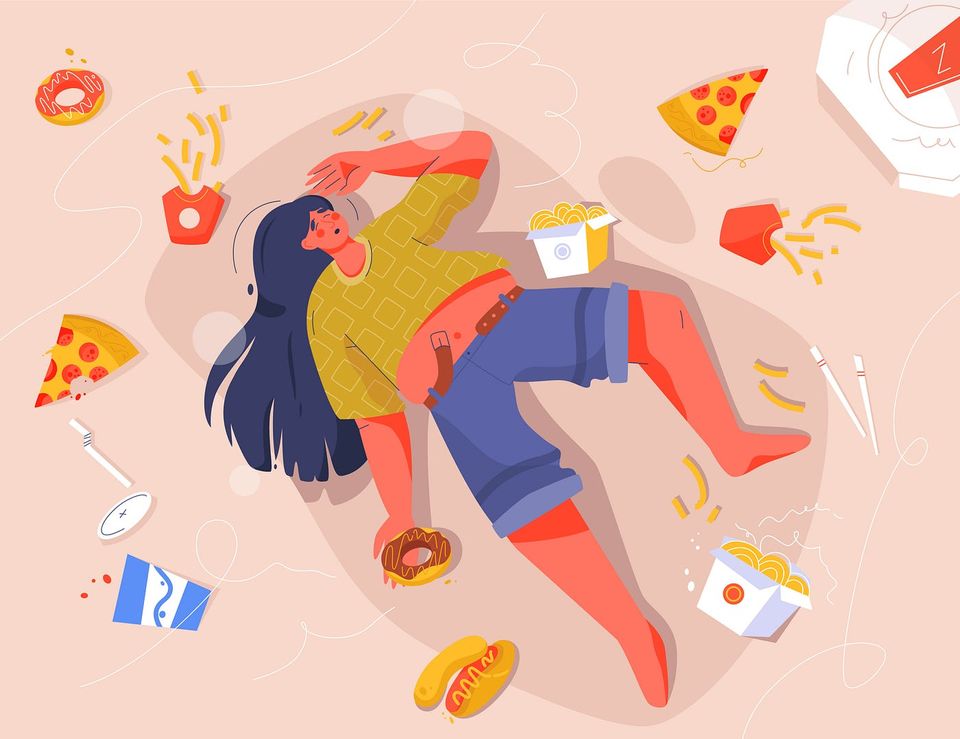The Surprising Link Between Overeating and Your Brain

We've all experienced those moments of overindulgence, where we find ourselves consuming more food than intended, only to be left with feelings of guilt and frustration. While it's easy to attribute this to a lack of willpower or self-control, recent insights into the relationship between our brain and eating habits suggest a deeper connection. In this article, we delve into the fascinating exploration of "Eating Too Much? Blame Your Brain," to unravel the complex mechanisms that influence our eating behavior and discover strategies to regain control.
The Brain's Influence on Eating Behavior:
The reward system in our brain, governed by neurotransmitters like dopamine, plays a significant role in regulating our appetite and food choices. This system creates a sense of reward and pleasure when we consume pleasurable foods, conditioning us to seek them out even when not hungry. Moreover, disruptions in the brain's hunger and satiety signals, controlled by the hypothalamus, can lead to miscommunication and result in overeating or feelings of dissatisfaction despite adequate intake.
Stress, Emotions, and Environmental Cues:

Stress and emotions can profoundly impact our eating habits, with cortisol—a hormone released during stressful periods—increasing appetite and cravings for high-calorie, sugary, and fatty foods. This stress-induced eating often serves as a coping mechanism to alleviate emotional distress. Additionally, our environment and external cues, such as the abundance of easily accessible and highly palatable foods, can override our brain's regulatory mechanisms and trigger mindless eating, leading to overconsumption.
Strategies to Regain Control:
Understanding the brain's role in eating behavior empowers us to adopt practical strategies to overcome overeating:
- Mindful Eating: By practicing mindfulness during meals, we can reconnect with our body's natural cues of hunger and fullness. Slowing down, savoring each bite, and paying attention to the sensory experience of eating can prevent overeating and promote a healthier relationship with food.
- Creating a Supportive Environment: Modifying our surroundings to facilitate healthier choices can be instrumental. Stocking our kitchen with nutritious foods, minimizing trigger foods, and having healthy snacks readily available make it easier to make conscious, nourishing choices effortlessly.
- Stress Management: Developing alternative stress-management techniques, such as regular exercise, meditation, or engaging in hobbies, can reduce our reliance on food as a coping mechanism. Finding healthy ways to manage stress prevents stress-induced overeating.
- Building Habits and Routines: Establishing consistent meal times and incorporating regular physical activity into our daily routines helps regulate appetite and prevents impulsive or mindless eating.
The Journey to Self-Discovery and Self-Compassion:

Overcoming overeating requires a holistic approach that encompasses not only physiological aspects but also emotional and psychological factors. Self-reflection and self-compassion are vital elements in this journey. Rather than blaming ourselves, we should view overeating as an opportunity for growth. Consulting with professionals, such as registered dietitians or therapists specializing in disordered eating, can provide valuable guidance and support.
Additionally, building a strong support system can make a significant difference. Surrounding ourselves with like-minded individuals through support groups or online communities fosters encouragement, accountability, and a safe space to share experiences and challenges.
The intricate relationship between our brain and overeating involves reward mechanisms, hunger and satiety signals, stress, emotions, and environmental cues. By understanding these influences and implementing strategies like mindful eating, creating a supportive environment, managing stress, and building habits and routines, we can regain control over our eating habits.
It's important to approach our relationship with food with compassion and understanding, embracing self-care and self-compassion. Through patience, support, and a willingness to explore and grow, we can overcome overeating and cultivate a healthier, more harmonious relationship with food and ourselves.
Remember, you are not alone in this struggle. Many individuals have faced similar challenges and have discovered their own paths to healing and balance. It's essential to approach this journey with patience and understand that setbacks are a natural part of the process. Progress, not perfection, should be the goal.
By empowering ourselves with knowledge about the complex interplay between our brain and eating behavior, we can start to regain control over our choices and develop a healthier relationship with food. Blaming our brain is not the answer; instead, it's about using this understanding as a tool for conscious decision-making and nourishment.
As you embark on the path to reestablishing a healthy relationship with food and your body, remember to be gentle and kind to yourself. Healing takes time, and every step forward is a victory. Celebrate the small victories and learn from any setbacks along the way. It's through self-reflection and self-compassion that we can truly transform our eating habits and find balance.